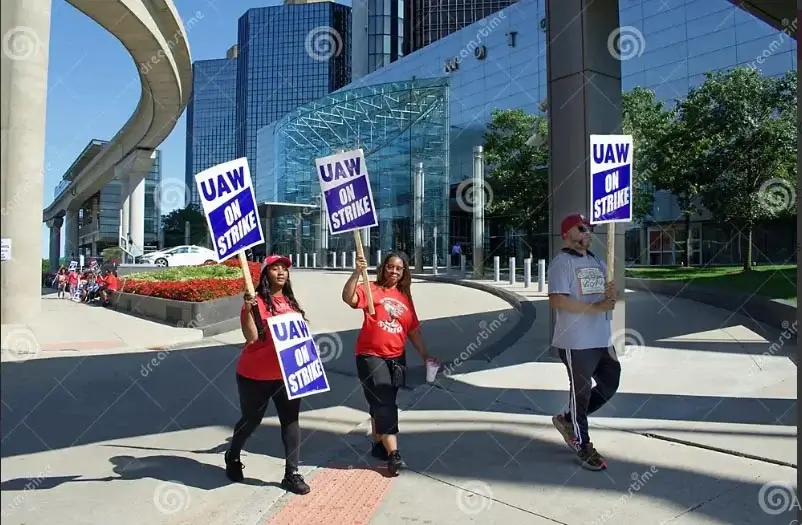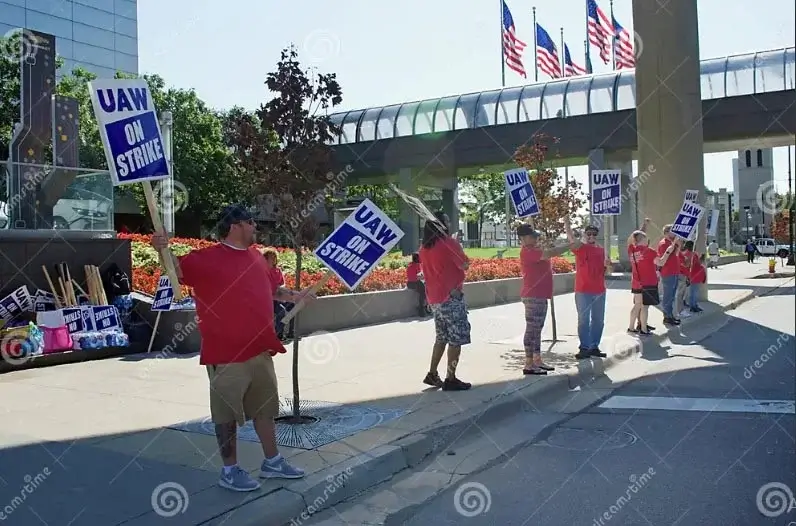The United Auto Workers(UAW) union has initiated a strike against General Motors, Ford, and Stellantis. This marks the first instance in the union’s history where it has simultaneously struck all three of America’s unionized automakers. On Friday, employees from three plants, one from each of the aforementioned automakers, in Missouri, Michigan, and Ohio, ceased work. The picketers were greeted with enthusiastic support from fellow union members who waved signs in solidarity.
The UAW has denominated its focused strike of three plants as a “Stand Up Strike,” which it has deemed a strategic “novel approach” to work stoppage. The union has communicated to its members that “as time progresses, additional locals may be summoned to ‘Stand Up’ and participate in the strike.” This tactic provides the union with the utmost leverage and flexibility in its endeavor to secure a just contract at each of the Big Three automakers.

The strikes initiated by the United Automobile Workers (UAW) commenced at General Motors’ Wentzville Missouri facility, which employs 3,600 UAW members. Additionally, Ford’s Michigan Truck plant located in Wayne, Michigan, will witness 3,300 strikes, while Stellantis’ Toledo Assembly complex in Ohio will have 5,800 employees on strike.
Overall, less than 13,000 individuals out of the United Automobile Workers’ (UAW) total membership of 145,000 engaged in a work stoppage.
“The aforementioned selection was made with great care by the UAW and represents a strategic approach aimed at impacting a significant number of suppliers and dealers, while minimizing the number of UAW workers initially participating in the strike and receiving strike pay,” stated Patrick Anderson, CEO of Anderson Economic Group.
The strike was initiated subsequent to the automakers’ dismissal of the union’s ambitious demands for increased wages, benefits, and job security for its members. Despite all three automakers reporting record or near-record profits, the union sought to regain numerous benefits that were relinquished over a decade ago when the companies were financially distressed and on the verge of bankruptcy.

The automobile manufacturers extended double-digit salary increments to the union, however, it proved insufficient to satisfy the union negotiators’ requisites. General Motors expressed its disappointment in a statement but affirmed its commitment to further negotiations.
The United Automobile Workers (UAW) has notified General Motors (GM) that they have commenced a strike at Wentzville Assembly in Missouri, effective from 11:59 pm. The statement expressed disappointment with the UAW leadership’s actions, despite the exceptional economic package offered by GM, which includes noteworthy wage hikes and manufacturing commitments.
GM has affirmed its commitment to engage in negotiations with the union in good faith, with the aim of expeditiously reaching an agreement that will benefit its team members, customers, suppliers, and communities throughout the United States.

On Thursday evening, Jim Farley, the CEO of Ford, conveyed to CNN that the organization was incapable of meeting all of the union’s requisites. In response, Shawn Fain, the President of UAW, stated to CNN on Friday morning that the assertions made by the Ford CEO were comical.
Although the strike is an unprecedented event, it is not as extensive as anticipated two days ago, when it seemed that all 145,000 UAW members across the three companies would be participating in the picket lines. This would have resulted in the largest strike of active workers in the nation in the past 25 years.
Numerous industry analysts had anticipated that the union would direct its attention towards plants that provided components to multiple facilities simultaneously. This strategic move would have resulted in the deprivation of essential parts to all 25 assembly plants belonging to the three companies, thereby causing a complete cessation of production. The strike would have been limited to only a few plants, possibly as few as two per company.
“Maintain an air of uncertainty for the corporations.”
The UAW’s plant selection will enable 22 assembly plants to maintain production and employment. Jeff Schuster, an industry consultant, expressed surprise at the unconventional negotiation tactics. The affected plants produce SUVs and pickup trucks that are not top sellers for the automakers. These include the Chevy Colorado, GMC Canyon, Chevy Express, GMC Savana, Ford Ranger, Ford Bronco, Jeep Wrangler, Gladiator, and Wrangler 4xe EV.

The UAW’s plant selection will sustain production and employment for 22 assembly plants. Industry consultant Jeff Schuster expressed astonishment at the unorthodox negotiation methods. The impacted plants manufacture SUVs and pickup trucks that are not high-performing for the automakers, such as the Chevy Colorado, GMC Canyon, Chevy Express, GMC Savana, Ford Ranger, Ford Bronco, Jeep Wrangler, Gladiator, and Wrangler 4xe EV.
Ford has stated that employees who are on strike and receiving a weekly strike benefit of $500 from their union will only receive a portion of the wages they would have earned had they remained employed. Additionally, the company has expressed concern that the strike’s prolonged duration may significantly impact Ford’s sales, thereby potentially reducing workers’ profit sharing checks to a significant extent.
Proposals and subsequent revisions of terms and conditions in a negotiation process.
Despite offers from the companies to increase hourly wages by up to 20% over the duration of the contracts, the union proceeded with a strike. The proposed wage increase would have resulted in a base pay of over $80,000 per year for the most senior autoworkers, exclusive of overtime or profit sharing bonuses, given the current top hourly pay of $32.32.
During negotiations, the union initially demanded an immediate 20% raise and four additional raises of 5% each throughout the contract’s lifespan. Although the union eventually lowered its pay demands, it was insufficient to bridge the gap between the automakers’ offers.
Furthermore, the union sought to reverse concessions made in 2007 and 2009, when Ford was on the brink of bankruptcy and GM and Chrysler were heading towards federal bailout. The union’s primary objective was to eliminate a lower tier of pay and benefits for workers hired since 2007, who can take up to eight years to achieve the same top hourly pay as their more experienced colleagues.

The UAW also demanded the reinstatement of a traditional pension plan for post-2007 hires, in addition to retiree health care coverage that they currently lack. The union also sought the return of cost-of-living adjustments (COLA) to protect workers from inflation, which they lost in the 2007 contract. The union argued that despite record or near-record profits, automakers’ CEO pay increased by up to 40%, and car prices reached all-time highs, real wages have declined due to inflation.
The union is advocating for an end to mandatory overtime, as stipulated in the recently expired contract, which required workers to work seven days a week for extended periods. Additionally, the union is seeking to limit or eliminate the use of temporary workers, who are compensated at approximately half the rate of senior workers.
The UAW is also proposing an increase in time off, including the possibility of a four-day, 32-hour work week without a reduction in pay.
However, beyond compensation and benefits, one of the most significant issues at the heart of the negotiations is the union’s apprehension regarding job losses and plant closures. According to the union’s calculations, the three automakers have shuttered 65 plants since the turn of the century, due to a combination of automation, outsourcing, and the loss of market share to non-unionized automakers.
Presently, the union is concerned that the automakers’ plans to invest billions of dollars each in transitioning from traditional gasoline-powered vehicles to an all-electric lineup will result in further job losses. Assembling electric vehicles requires fewer labor hours than gas-powered cars due to their simpler construction. The automakers are rushing to construct numerous plants to manufacture massive EV batteries to power the new cars, but they intend to pay significantly lower wages than those paid to UAW workers at engine and transmission plants that would be at risk from the shift to EVs.




